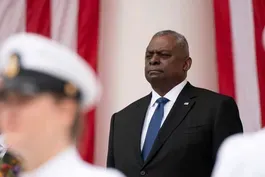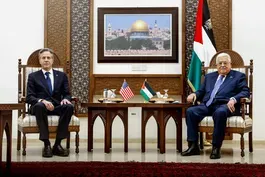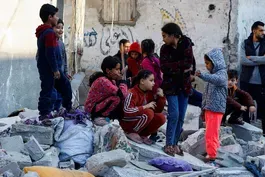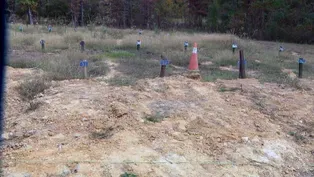
Houthi rebels launch attacks on ships in Red Sea
Clip: 1/10/2024 | 8m 50sVideo has Closed Captions
Houthis launch largest drone and missile attack targeting ships in Red Sea
The U.N. Security Council demanded that Houthi rebels in Yemen stop attacking international ships in the Red Sea. The U.S. military says there have been more than two dozen attacks in the last seven weeks. The most serious attack was Tuesday when Houthis fired more than 20 drones and missiles at U.S. and allied warships. Nick Schifrin reports on the escalation and U.S. options.
Problems with Closed Captions? Closed Captioning Feedback
Problems with Closed Captions? Closed Captioning Feedback
Major corporate funding for the PBS News Hour is provided by BDO, BNSF, Consumer Cellular, American Cruise Lines, and Raymond James. Funding for the PBS NewsHour Weekend is provided by...

Houthi rebels launch attacks on ships in Red Sea
Clip: 1/10/2024 | 8m 50sVideo has Closed Captions
The U.N. Security Council demanded that Houthi rebels in Yemen stop attacking international ships in the Red Sea. The U.S. military says there have been more than two dozen attacks in the last seven weeks. The most serious attack was Tuesday when Houthis fired more than 20 drones and missiles at U.S. and allied warships. Nick Schifrin reports on the escalation and U.S. options.
Problems with Closed Captions? Closed Captioning Feedback
How to Watch PBS News Hour
PBS News Hour is available to stream on pbs.org and the free PBS App, available on iPhone, Apple TV, Android TV, Android smartphones, Amazon Fire TV, Amazon Fire Tablet, Roku, Samsung Smart TV, and Vizio.
Providing Support for PBS.org
Learn Moreabout PBS online sponsorshipin Yemen stop attacking international ships# in the Red Sea.
The U.S. military says ther have been more than two dozen attacks in the# last seven weeks, the most serious yesterday,## when Houthis fired more than 20 drones and# missiles right at U.S. and allied warships.
Nick Schifrin looks at the Houthi# escalation and U.S. options.
NICK SCHIFRIN: In the middle of the Red Sea,# British sailors shoot down incoming Houthi## drones and missiles.
The U.K. and U.S. called# it the Houthis' largest and most com Secretary of State Antony Blinken: ANTONY BLINKEN, U.S. Secretary of# as they did yesterday, there will b NICK SCHIFRIN: British# Defense Minister Grant Shapps: GRANT SHAPPS, British Defense Minister: And we# a major ability to move goods around the world is## being cut off by terrorists and# thugs, and we therefore must act.
NICK SCHIFRIN: Since mid-November, Houthi rebels# have targeted, seized international vessels and## kidnapped foreign sailors.
The Houthis have# said they target ships linked to Israel,## but, today, a Houthi spokesman said# the target was an American warship,## retribution for the U.S. Navy last month sinking# Houthi boats and killing 10 Houthi f YAHYA SAREA, Houthi Military Spokesman# (through translator): The Yemeni Houthi## armed forces affirm hostile threats within the legitimate right# to defend our country, people and nation.
NICK SCHIFRIN: Some 15 percent of world# shipping goes through the Suez Canal,## which links the Red Sea with the Mediterranean.# Houthi attacks have so far co mmerce, forcing shippers to reroute their# vessels and increasing shipping costs.
Last month, the U.S. launched a multinational# coalition to protect commercial shipping.
And,## last week, the U.S. and 13 other countries issued# what an official called a final warning.
"The## Houthis will bear the responsibility of the# consequences should they continue to threaten## lives, the global economy and the free flow of# commerce in the region's critical waterways."
But, so far, the U.S. has not# followed through on that threat.
JOHN KIRBY, NSC Coordinator For# Strategic Communications: The best## solution to th NICK SCHIFRIN: The Houthis are a rebel group# backed by Iran that in 2014 seized the Yemeni## capital, Sanaa.
For years, they fought Saudi# Arabia as part of a brutal civil war that## killed hundreds of thousands, but, for 20# months, there's been a shaky cease-fire.
Houthi missiles are based on Iranian# technology, and a U.S. official tells "PBS## NewsHour" Iran is coordinating the current# attacks and helping provide the targets.
MAN: The draft resolution is adopted.
NICK SCHIFRIN: In New York today, the# U.N. Security Council passed demanding the Houthis cease all attacks# and release two dozen fo BARBARA WOODWARD, British Ambassador to the# United Nations: We will not stand by and allow## the Houthis to threaten civilian vessels and# hold globa NICK SCHIFRIN: So what is motivating the Houthis## to launch these attacks an For that, we turn to Jonathan Panikoff,## the director of the Scowcroft Middle# Co uncil and the former deputy national# intelligence officer for the Jonathan Panikoff, thank you very# much.
Welcome to the "NewsHour."
What do the Houthis gain# by launching these attacks?
JONATHAN PANIKOFF, Atlantic Council:# Thank you so much for having me.
I think the Houthis really is the way I would frame it.
The Houthis don't# have access to Yemen's energy resources.
The Houthis are trying to negotiate a final resolution# in terms of the long-running conflict with Saudi## Arabia.
I think it's provided them, I think,# greater leverage probably in those negotiations.
And so I think the Houthis see this as a# realistic policy option in order to try## and better their position for the long# term in Yemen for the years to come.
NICK SCHIFRIN: But do they also risk# something by continuing these attacks,## especially after they came out today and said# explicitly that the target was JO NATHAN PANIKOFF: Certainly, they could.
Obviously, the United St Sea.
It's had multiple countries join, though,# importantly, not some of the Gulf countries,## like Saudi Arabia and the Emiratis, who# have long been in conflict with the Houthis.
So it's possible, obviously, the U.S. will# respond.
And we saw some discussion today## and references that the U.S. and its# allies are considering doing so.
But## the Houthis have been having a war for# years now.
I'm skeptical that a response,## especially a one-time response or even# two-time response, is necessarily going## to deter them if they think that's really going# to better their position in the NI CK SCHIFRIN: The U.S. last week gave what a# U.S. official called a final warning.
And you## heard earlier today John Kirby from the# National Security Council there clearly## sending the message that still they# hope the Houthis stop these attacks.
Bottom line, do you think the U.S.# should launch a military strike?
JONATHAN PANIKOFF: I think a military strike is## probably going to be nec It's not that I think a military strike is# necessarily likely to stop the Houthis from## continuing their attacks, but not having the# deterrence that the U.S. needs by refusing## to respond or declining to respond also# signals to other actors in the region,## other Iranian-backed proxies# that they too may have a level## of freedom to engage in attacks against# U.S. forces, whether in Iraq or in S or that Hezbollah may be able to actually push# the boundaries in Lebanon and into Israel.
The U.S. has said very clearly that's its# number one goal, is to avoid a regional## conflict.
I think not responding at this point# risks deterrence not being taken seriously by## our adversaries and actually bringing about# the very conflict the U.S. is trying to avoid.
NICK SCHIFRIN: The other argument that I hear# from experts who I spoke to today is that, look,## a military strike would open up another front,# which is a bad idea, and that any weapons or## any capabilities of the Houthis that the U.S.# destroyed would quickly be refilled by Iran.
What's your response to that?
JONATHAN PANIKOFF: I thi I think whether it opened up another front# assumes that the front hasn't already opened.## I think we have seen 26 Houthi attacks# since the 19th of November.
We're seeing## 15 percent of all maritime commerce goes# through the Red Sea.
And you're starting to## see huge amounts now having to go around# at big cost to companies and countries.
I think we're already really quite# on the precipice of being there,## of having another front to open.
I actually# worry much more that not responding now,## as we haven't in a meaningful# way for about a month-and-a-half,## has clearly been a strategy that# hasn't worked.
If we don't respond now,## I actually think it increases the chance that we# end up in a regional conflict, NI CK SCHIFRIN: In some ways, could Saudi Arabia# actually want the United States to launch this## military strike, to degrade Houthi capabilities,# and then to come in afterward and say, oh,## we're the peacemaker, we're going to# continue these talks with the Houthis?
JONATHAN PANIKOFF: I think the Saudis are# certainly supportive of the mili if the U.S. is successful in them.# And that really means that the U.S.## actually manages to be successful# in having some level of deterrence.
The flip side of that is that if the U.S. says# we're going to do one strike or two strikes,## but not actually keep the pressure on, then# my guess is the Saudis are going to be pretty## annoyed and feel like it didn't actually do much,# because you didn't stay engaged in the conflict.
NICK SCHIFRIN: And, finally,# let's talk about Iranian support.
The National Security Council spok saying that Iran was -- quote -- "deeply# involved in planning the operations against## commercial vessels" and was -- quote -- "providing# tactical intelligence on that vessel's locations."
How does that work?
JONATHAN PANIK its various partners and proxies throughout# the region, and that includes the Houthis.
In this case, it means that the Iranians# may have identified targets that they have## passed to the Houthis.
It could mean that# the Iranians have certain targets that they## have known for years they have wanted Houthis# to strike, or it could mean that the Houthis## identified targets and went to the Iranians to# validate them, to say, does this make sense?
So, I think there's a variety of ways that# that can work, but the bottom line is, one way## or the other, Iranian support for the Houthis is# helping them to take these strikes successfully.
NICK SCHIFRIN: Jonathan Panikoff for the# Atlantic Council, thank you very much.
JONATHAN PANIKOFF: Thank you.
Austin's diagnosis highlights stigma around prostate cancer
Video has Closed Captions
Defense secretary's diagnosis highlights stigma surrounding prostate cancer (5m 13s)
Blinken urges Palestinian Authority to govern Gaza after war
Video has Closed Captions
Blinken urges Palestinian Authority to show it's ready to govern Gaza after war (4m 6s)
Experts address Israel-Hamas war's impact on children
Video has Closed Captions
How mental health experts are handling the Israel-Hamas war's lasting impact on children (8m 11s)
House Republicans poised to impeach DHS Secretary
Video has Closed Captions
House Republicans poised to impeach DHS Secretary over problems at southern border (6m 30s)
Hundreds of bodies found buried behind Mississippi jail
Video has Closed Captions
Families in disbelief after hundreds of bodies found buried behind Mississippi jail (7m 28s)
Quantum computing lab transformed into artistic oasis
Video has Closed Captions
Why Google transformed a quantum computing lab into an artistic oasis (5m 30s)
Providing Support for PBS.org
Learn Moreabout PBS online sponsorshipSupport for PBS provided by:
Major corporate funding for the PBS News Hour is provided by BDO, BNSF, Consumer Cellular, American Cruise Lines, and Raymond James. Funding for the PBS NewsHour Weekend is provided by...

















